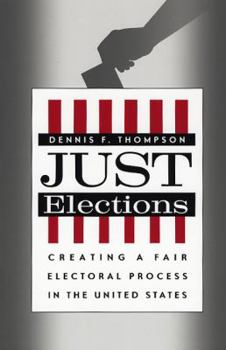Just Elections: Creating a Fair Electoral Process in the United States
Select Format
Select Condition 
Book Overview
The 2000 election showed that the mechanics of voting such as ballot design, can make a critical difference in the accuracy and fairness of our elections. But as Dennis F. Thompson shows, even more fundamental issues must be addressed to insure that our electoral system is just. Thompson argues that three central democratic principles-equal respect, free choice, and popular sovereignty-underlie our electoral institutions, and should inform any assessment of the justice of elections. Although we may all endorse these principles in theory, Thompson shows that in practice we disagree about their meaning and application. He shows how they create conflicts among basic values across a broad spectrum of electoral controversies, from disagreements about term limits and primaries to disputes about recounts and presidential electors. To create a fair electoral system, Thompson argues, we must deliberate together about these principles and take greater control of the procedures that govern our elections. He demonstrates how applying the principles of justice to electoral practices can help us answer questions that our electoral system poses: Should race count in redistricting? Should the media call elections before the polls close? How should we limit the power of money in elections? Accessible and wide ranging, Just Elections masterfully weaves together the philosophical, legal, and political aspects of the electoral process. Anyone who wants to understand the deeper issues at stake in American elections and the consequences that follow them will need to read it. In answering these and other questions, Thompson examines the arguments that citizens and their representatives actually use in political forums, congressional debates and hearings, state legislative proceedings, and meetings of commissions and local councils. In addition, the book draws on a broad range of literature: democratic theory, including writings by Madison, Hamilton, and Tocqueville, and contemporary philosophers, as well as recent studies in political science, and work in election law.
Format:Paperback
Language:English
ISBN:0226797643
ISBN13:9780226797649
Release Date:July 2004
Publisher:University of Chicago Press
Length:269 Pages
Weight:1.00 lbs.
Dimensions:0.7" x 6.6" x 8.8"
Customer Reviews
1 rating
Terrific book
Published by Thriftbooks.com User , 21 years ago
Dennis Thompson has written an outstanding book that discusses a number of important issues relating to how we conduct elections.I want to take particular issue with the first reviewer, who seems literally unable to understand why denial of the vote to felons after they have served there sentence might be thought to raise serious problems. Even those who say, "Do the crime, pay the time," might see that once one has indeed paid the time, it makes a lot of sense to try to integrate the individual back into the society. Why should we require the person in effect to wear a scarlet F that makes him or her a permanent outsider and will only increase the probability of frustration, resentment, and ultimate recidivism? An intermediate policy would require that the released felon not violate the law for, say, three years. But what in the world justifies the lifetime ban that many states have adopted? Moreover, given that we live in a country that "felonizes" and incarcerates more people, per capita, than practically any other country on earth--and we really shouldn't be proud of being in the company of our only close competitors--it is important that those who have experienced incarceration have a political voice. Perhaps we might have done something with our insane drug laws had the hundreds of thousands of released felons jailed because of drugs been able to vote. Or we might actually try to give prisoners some job training rather than treat them in ways that add to the likelihood that they will be recidivists. And, of course, there's the practical reality that the exclusion of felons from the electorate has disproportionate effect on African-Americans, especially when, as in Florida in 2000, a zealously Republican administration is recklessly indifferent to making sure that the persons it is trying to eliminate from the voting rolls were actually felons instead of simply having a name similar to that of a felon. There's no justification for treating released felons as permanent "non-persons." One might disagree with everything I say, just as one doesn't have to agree with everything that Thompson says. But it is foolish to dismiss his arguments, whether about felons or about anything else he discusses. He is one of our most thoughtful political theorists, and he's been writing about the practical meaning of democracy for the past 35 years. Anything he writes, most certainly including this book, is well worth reading.Sanford LevinsonUniversity of Texas Law School





